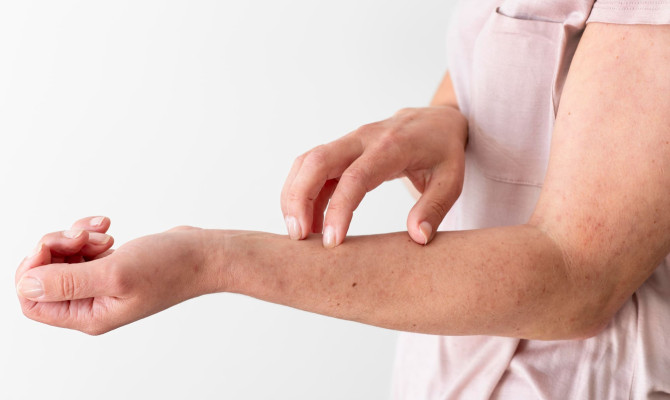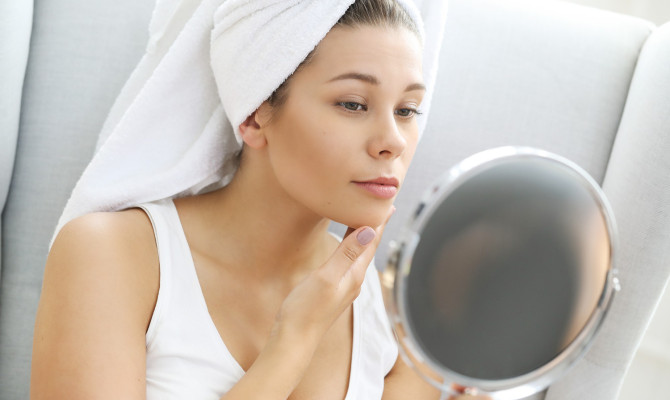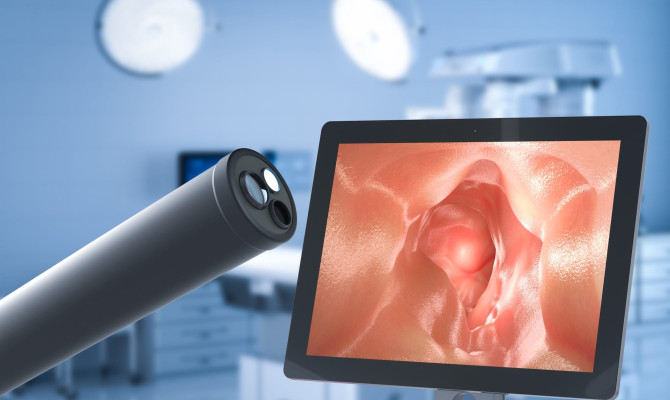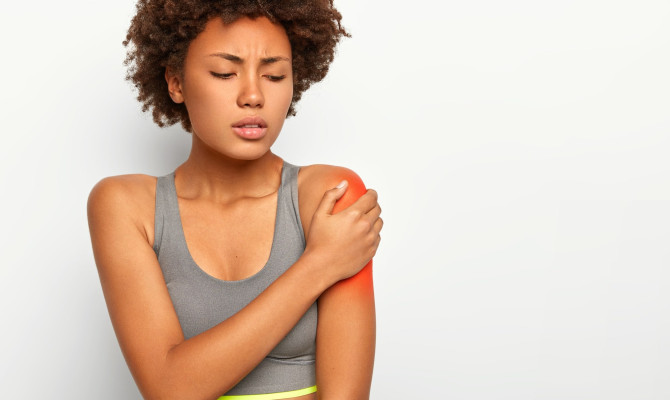Causes & Management Of Chicken Skin Under The Eyes

- Eyes
- 11 Oct 2023
Overview
Chicken Skin Under the Eyes
Our facial skin encounters several changes during specific phases of our life. We get acne and pimples during adolescence, desiccated skin during adulthood, and creases and thin lines yearly. Further, an individual can get another alteration in the facial skin that appears as tiny white swellings that people call chicken skin. However, the white bulges (chicken skin) are not usually problematic and harmful. Yet if the chicken skin becomes frustrating, one should always speak to a skin specialist (Dermatologist) to know the cause and get accurate treatment 1 Overview | Researched based study from National Institutes of Health .
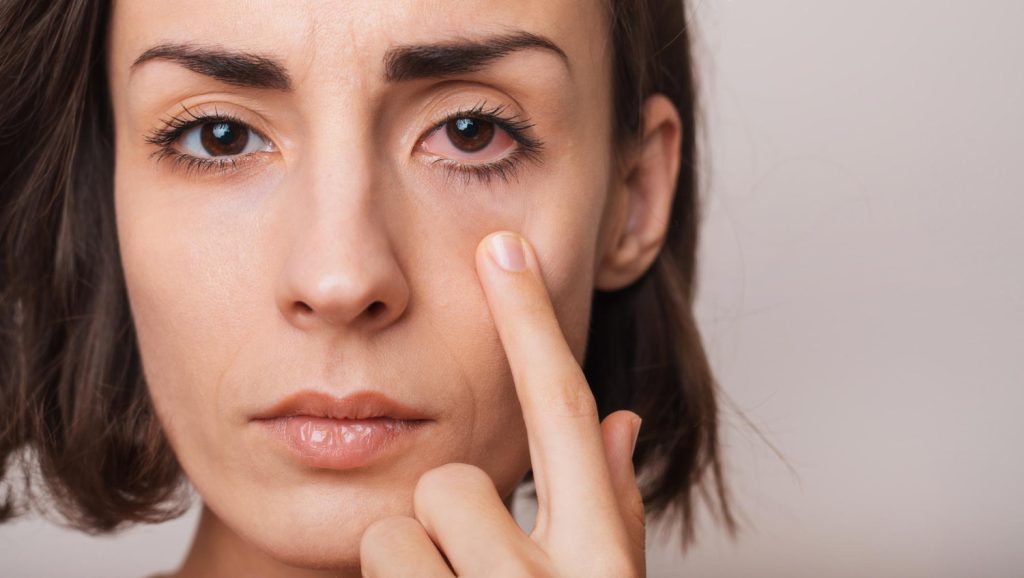
Most people often become anxious about seeing chicken skin under eyes as they are unaware of what the condition is and what it causes, so the article will describe chicken skin under the eyes, its causes, diagnosis, treatment, prevention, and some home remedies to manage it. It will answer specific queries that people are interested in knowing about chicken skin under the eyes.
Causes
What Causes Chicken Skin Under the Eyes?
There are numerous reasons for chicken skin under the eyes. Some of the usual causes are listed below:
- Milia
- Allergy
- Keratosis Pilaris
- Syringomas
- Chalazia
- Styes
Milia
- Milia are benign (harmless) white tiny pointed pimples that come from the skin preferably in the cheek area, nose, eyelids, or under the eyes.
- It occurs due to keratin accumulation in the skin’s sweat holes. Keratin is a biological substance that sustains our skin, hair, and nails.
- Chicken skin forms on the skin’s surface when keratin blocks the skin’s sweat holes. Infants and youngsters are more prone to milia. Adults show up milia, usually in the facial area.
- Milia resolved independently within a couple of days, even without treatment. Sometimes, milia appear after starting a new drug or skin damage.
Allergy
- Sensitivity reactions or allergies can create numerous signs on the skin. The most common symptoms are pimples and urticaria (hives). The pimples enclose an itchy, swollen skin.
- Several people get pus-filled pimples when applying a face lotion due to the skin’s sensitivity reaction.
- Most sensitivity reactions resolve in a few days and do not require treatment. However, the individual must avoid the product or food causing the sensitivity.
Keratosis pilaris at a young age
- Keratosis pilaris (chicken skin) is an annoying skin condition, usually not severe. It appears as a red, white, or brown pimple near the hair follicles under the eyes, other facial areas, legs, and arms.
- The disease is more frequent in youngsters and adolescents, and when they reach adulthood, the chicken skin becomes more prominent with further enlargement.
Syringomas
- Syringomas are benign painless yellow, white, and colored fleshy growths from the sweat gland.
- They show up in collections on the cheeks or under the eyes. However, they might occur in any body part and sometimes grow in size and form more significant groups.
- They are more frequent in females than males
Chalazia
- Chalazia are painless skin-colored pimples due to blocked sebaceous glands (oil glands). It is not an infection and might last for prolonged periods.
- Chalazia pop up as one pimple, but a collection of Chalazia might seem like chicken skin.
Styes
- Styes are painful red swellings just like blemishes (acne). They occur due to hair follicle infection.
- They frequently emerge on the eyelid’s outer surface, but they can also show up deep seated in the eyelid, causing puffiness 2 Causes | Researched based study from National Institutes of Health .
Symptoms
Symptoms of Chicken Skin Under The Eyes
Some of the commonly associated symptoms with chicken skin under the eyes are listed below:
- Desiccated skin
- Itchiness
- Discoloration around the pimples
- Red, white, or brown heads on the pimples
However, an individual’s associated symptoms will depend on the reasons for the small pimple’s occurrence 3 Symptoms| Researched based study from National Institutes of Health .
Individuals must consult the health professional if they observe any of the following symptoms:
- Intense painful pimples
- Pus discharge from the pimples
- Itchy red rash all over the pimples
- Swelling around the pimples 9 Symptoms| Researched based study from National Institutes of Health .
Diagnosis
Diagnosing of Chicken Skin Under the Eyes
- The dermatologist will try to find the cause of the pimples with a skin analysis. If the finding is indistinct, he might order a skin biopsy for further analysis in a laboratory.
- Skin biopsy is the method of removing cells or tissues from the body’s surface for in-depth examination. It will enable the physician to exclude other conditions, viz. skin cancer and infection for the disease 4 Diagnosis| Researched based study from National Institutes of Health.
Treatment
Treatment for Chicken Skin Under the Eyes
There isn’t any cure for conditions like milia and keratosis pilaris (chicken skin), but there are therapeutic options that can improve the look of uneven pimples. Some of the commonly available treatments are listed below-
Retinol creams
- Retinol (a kind of vitamin A) is a skin-supportive ingredient that assists in skin renewal and pimple relief and helps prevent the dead cells accumulation in the skin pores.
- Chemical peel utilizes a chemical substance to remove the outer skin surface to acquire the new smooth skin underneath.
Microdermabrasion
- Microdermabrasion is an aesthetic method to remove the outer damaged skin surface blocking the pores.
- It assists in getting an even skin texture and improves the overall skin appearance.
Cryotherapy
- It is the application of intense cold temperatures, such as liquid nitrogen, to eliminate the unusual tissues.
- However, the Cryotherapy procedure might be unsafe for pimples near the eyes.
Deroofing
- Deroofing is the method in which a fine sterilized needle removes the cyst with the help of an alternating electric current (electrosurgery) 5 Treatment | Researched based study from National Institutes of Health .
Chicken skin under-eye creams:
Medicated creams
Based on the condition the health provider will decide the strength of the prescription moisturizers.
Physicians usually prescribe medicated creams for chicken skin with the following ingredients-
- Salicylic acid
- Glycolic acid
- Alpha hydroxy acid
Medicated creams (Retin-A) might decrease the keratin accumulation in chicken skin.
Over the counter lotions
- Desiccated skin makes chicken skin condition even worse.
- So, individuals can use moisturizing lotions that contain alpha hydroxy acids and ammonium lactate to ward off skin dehydration and prevent chicken skin conditions from worsening 6 Treatment| Researched based study from National Institutes of Health .
Remedies
Home Remedies for Chicken Skin Under Eyes
Adopting a few practices at home might decrease frustration and help resolve the blocked pores. Some of the common home remedies are listed below-
Rose water
- Research studies have shown that rose water application decreases pain and swelling. One can swab rose water on the exaggerated skin to get instant relief 7 Home Remedies | Researched based study from National Institutes of Health .
Over-the-counter creams
- Specific creams are available in the health stores to eliminate dead skin cells and for speedy cell renewal.
- It might help reduce chicken skin. Some examples are creams containing lactic acid or alpha hydroxy acid.
Water baths
- Taking a warm bath might relax the skin’s pores. One might clean the body with a dry brush or loofah to eliminate the dead tissues.
- However, avoid staying in the warm bath for extended periods, as it might destroy the body’s natural oil and worsen the swelling.
Moisturizing treatment
- Desiccated skin might cause chicken skin conditions even worse, so daily moisturizing lotion or creams might help.
Humidifiers
- Humidifiers are appliances that release water vapor to maintain the moisture content in the air. It assists in averting dryness and pimple formation under the eyes 7 Home Remedies| Researched based study from National Institutes of Health .
Prevention
Prevention of Chicken Skin Under the Eyes
Individuals might adopt the following tips to prevent chicken skin under the eyes.
Apply night cream
- Regularly use a night cream with vitamin E or A to keep the skin hydrated and for faster skin renewal.
Scrubbing of the skin
- Individuals must adopt the habit of scrubbing the skin regularly while washing.
- It helps speedy cell renewal and prevents keratin accumulation in the skin pores.
Avoid poking the bumps
- One must always avoid poking the pimples. Poking (digging) pimples worsen the skin condition and might cause infections 8 Prevention | Researched based study from National Institutes of Health .
FAQs
Frequently Asked Questions About Chicken Skin Under the Eyes
Q. Why do we have chicken skin under the eyes?
- The chicken skin under the eyes might be due to dead skin tissue or keratin protein accumulated in the oil glands and hair follicles.
- Excessive eye cream usage and hereditary reasons might also cause chicken skin under eyes.
Q. Will chicken skin under the eyes go away?
- Some chicken skin under the skin resolves on its own without any treatment, while treatment options are available for those that do not go off naturally.
Q. How can I improve my under-eye skin naturally?
Here are some tips to improve the under-eye skin naturally-
Use creams containing hyaluronic acid
- Hyaluronic acid is an organic (natural) compound in our body, viz; joints and eyes. It is also present in specific cosmetic products viz; creams, serum, and helps decrease the creases in the skin.
- People can apply the hyaluronic acid containing serum/cream on the under-eye area to increase the hydration and keep it chubby.
Tea compress
- Black tea, chamomile, and green tea contain antioxidants that decrease the pain and swelling around the eye area.
- One can immerse tea bags in lukewarm water and put them over the eyes for 15 to 20 minutes to get good relief 10 FAQs | Researched based study from National Institutes of Health .
Facial massage
- Manual face massage improves blood circulation and helps decrease the distention around the eyes. It betters the look of the eye area.
Moisturizer
- Lotions containing hyaluronic acid help keep the skin hydrated. It can also assist in reducing the creases under the eyes.
Night eye creams
- Night eye creams maintains the under-eye skin moisture when one is asleep. Retinol-containing eye creams decrease the fine lines under the eyes.
Exfoliate the skin
- Exfoliating cosmetic substances containing acids or enzymes removes the unwanted skin cells without discomfort. It enhances the skin’s appearance under the eyes 11 FAQs | Researched based study from National Institutes of Health .
Takeaway
Chicken Skin Under the Eyes: Self-Care is Essential
Chicken skin under the eyes is seldom a worrying issue as it is harmless. However, most people often become anxious about the bumps, thinking about the facial appearance. Most chicken skin under the eyes subsides on its own over time. However, specific treatment options are available to manage the condition for those who do not go off. Taking excellent skin care and putting moisturizing lotion might help manage the condition to a great extent.
Any feedback on this article?
 This Articles content was accurate
This Articles content was accurate Very Informative Article
Very Informative Article I have a question or a comment
I have a question or a comment
 This article contains inaccurate content
This article contains inaccurate content This article was not helpful
This article was not helpful I have a question or a comment
I have a question or a comment
We appreciate your helpful feedback!
Checkout our social pages
References
-
National Institutes of Health
Overview
-
National Institutes of Health
Causes
-
National Institutes of Health
Symptoms
-
National Institutes of Health
Diagnosis
-
National Institutes of Health
Treatment
-
National Institutes of Health
Treatment
-
National Institutes of Health
Home remedies
-
National Institutes of Health
Prevention
-
National Institutes of Health
Symptoms
-
National Institutes of Health
FAQs
-
National Institutes of Health
FAQs















